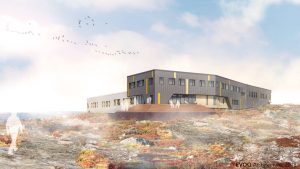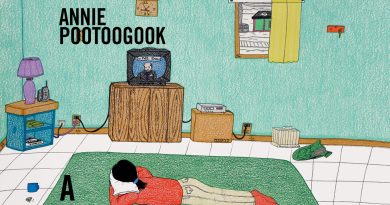Isuarsivik recovery centre celebrates 30 years with plans to grow

The Isuarsivik Regional Recovery Centre is celebrating 30 years this year with a mural and ambitions to expand across Nunavik.
“To be able to say that we have the experience, we have the know-how, is very helpful,” said Etua Snowball, director general of the centre, in an interview about the milestone.
“When we ask for funding from the ministry, funding agents, or whoever it may be, [it is helpful] because we do have that experience now.”
Isuarsivik offers culturally attuned programming for Nunavimmiut dealing with addiction.
Snowball said he hopes the process of painting a mural on Isuarsivik’s building will begin by this summer. Appearing on the wall facing the parking lot, the piece, made by Inuit artists, will show the history of the centre and feature people who have been involved throughout the process.
Isuarsivik is also working on a 30-year detailed timeline of its evolution over the years. As of now, its website presents a small chronological section that goes through Isuarsivik’s history.
In the 1990s, people in Nunavik received addiction-related services through the Quebec government at Pavillon Foster in Montreal, which is still open to this day.
Isuarsivik was created in 1995 through the joint efforts of Makivvik Corp. and Johnny Adams, who was Kuujjuaq’s mayor at the time. At first, the centre only offered its services to Kuujjuammiut.
The path from creation to where Isuarsivik stands today took “dedication and resilience,” Snowball said.
“When you see the need, you go forth and find the solutions. Until we do, we keep going.”
Isuarsivik moved into a https://nunatsiaq.com/stories/article/isuarsivik-opens-its-doors-to-nunavimmiut-over-5-days/ new 22-bed home in 2023. The people who come there, who staff refer to as guests, stay for treatment programs that run in cycles. The first cycle was completed in spring 2023, and staff are now into their sixth cycle.
Snowball said it is going well, but “we are on a learning curve.”
Because staff are trying different scenarios with different guests, they adapt to the various conditions each cycle. The current batch are single-parent families, for example.
“We learn from them and find solutions for every aspect of who we have as guests,” Snowball said.
He added he hopes to see Isuarsivik in all Nunavik communities over the next 30 years, and possibly into other Inuit regions.
“This definitely could be a possibility,” Snowball said.
Related stories from around the North:
Canada: Gov. in Canada’s Northwest Territories not doing enough to treat, prevent addictions, says federal auditor, CBC
Finland: Climate change worries Finland’s young reindeer herders, Yle News
United States: Alaska capital budget vetoes to hit homelessness, addiction treatment, Alaska Public Media



